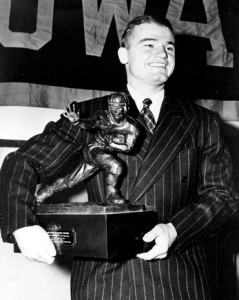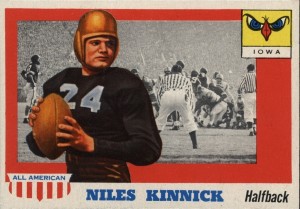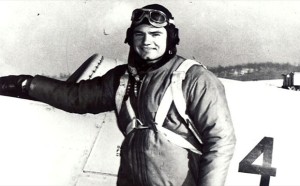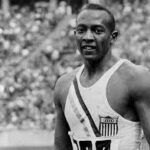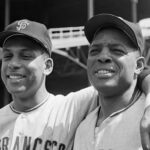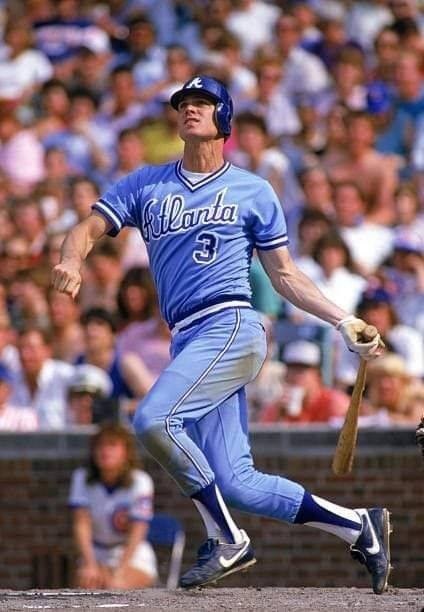Memorial Day Remembrance: Nile Kinnick – American Hero
In honor of Memorial Day, we remember a former Heisman Trophy winner who made the ultimate sacrifice for our country and was more than just a football hero; he was an American Hero.
In 1939 with war starting in Europe, but the United States still two years removed from entering the war, Nile Kinnick Jr. led the Iowa Hawkeyes to an improbable run into the national Top 10.
A talented all-around athlete, Kinnick had been a Junior Legion baseball teammate of Bob Feller. He also excelled in both basketball and football first at Adel High School in his hometown and then, after the family moved to Omaha following his sophomore year, at Benson High School.
Choosing to return to his home state and attend the University of Iowa, Kinnick played both football and basketball as a sophomore in 1937.
He earned All-Big 10 and third team All-American honors in football. On the basketball court he ranked 15th in the Big 10 in scoring.
Following an injury-plagued junior season in which he earned honorable mention honors on the gridiron, Kinnick decided not to continue his basketball career and instead looked to concentrate on his senior football season for the Hawkeyes.
After posting a 2-13-1 record on the football field during the two previous seasons, the Hawkeyes and their senior leader looked to change their fortune in 1939.
Dubbed the “Ironmen” because most of the starters played both ways and rarely came off the field, the Hawkeyes posted a 6-1-1 record, finished second in the Big 10 and were ranked ninth in the final AP Poll.
Kinnick was the unquestioned star of the Hawkeyes in 1939.
Known for his late game heroics, Kinnick scored the game winning touchdown against Notre Dame and threw late touchdown passes in wins over Indiana and Wisconsin.
Playing primarily at left halfback, Kinnick rushed for 374 yards and five touchdowns. Though he attempted only 31 passes, he totaled 638 passing yards and 11 touchdowns. He also served as the punter and placekicker while also returning punts and kickoffs.
Overall, Kinnick was involved in 16 of the 19 touchdowns scored by the team during the season and 107 of 130 total points. He established 14 school records during the season.
Kinnick was a consensus first-team All-American and the only unanimous selection by the Association Press. He was named the Big Ten MVP and received the Walter Camp Award and the Maxwell Award. The Associated Press chose Kinnick over such notable athletes as Joe Louis, Joe DiMaggio and Byron Nelson as the 1939 AP Male Athlete of the Year.
In the fourth annual selection of the Heisman Trophy, Kinnick easily out-distanced Michigan junior Tom Harmon, who went on to win the award the following year.
The acceptance speech that Kinnick gave at the award ceremony in New York reflected the sentiment in the country just two years before Pearl Harbor and illustrated the character of the then-21-year old.
After recognizing his coaches and teammates, Kinnick thanked God that he was “warring on the gridirons of the Midwest, and not on the battlefields of Europe.” He also added that, “the players of this country, would much more, much rather struggle and fight to win the Heisman award, than the Croix de Guerre.”
Following Kinnick’s speech, Bill Cunningham of the Boston Post wrote, “This country’s okay as long as it produces Nile Kinnicks. The football part is incidental.”
After graduation, Kinnick was drafted by the Brooklyn Dodgers in the second round of the 1940 NFL Draft and offered a $10,000 contract. Instead, Kinnick chose to return to Iowa as an assistant coach while attending law school.
In his only appearance against professional players, at the 1940 Chicago All-Star Game, Kinnick gave a glimpse of what might have been had he joined the NFL.
He scored two touchdowns and kicked four extra points in a 45-28 loss to the defending NFL Champion Green Bay Packers. It was noted that all four touchdowns by the All-Star team came while Kinnick was in the game and they managed only one first down when he was on the sidelines.
The grandson of a former Iowa Governor George W. Clarke, Kinnick was reportedly interested in politics.
As an undergraduate, Kinnick had maintained a 3.4 grade point average, been selected as a Phi Beta Kappa and graduated “with distinction.”
In his first year of law school, Kinnick ranked third in his class. He also served as an assistant coach for the Hawkeyes, working with the freshman team and assisting in scouting of upcoming games.
The following year, he left law school and enlisted in the Naval Air Reserve. He reported for induction three days before Pearl Harbor on December 7, 1941.
Training to be a fighter pilot, he was deployed with the USS Lexington in late May of 1943.
On June 2, 1943 Kinnick was on a routine training mission off the coast of Venezuela in the Gulf of Paria. He had been flying for over an hour when his plane developed an oil leak that was too serious for him to either reach land or the USS Lexington.
Kinnick followed standard military procedure and executed an emergency landing in the water approximately four miles from his ship. Rescue boats arrived on the scene a mere eight minutes later, but they found only an oil slick. His body was never recovered.
Since his death, Kinnick has received many honors and memorials.
He was a member of the initial class of inductees into the College Football Hall of Fame in 1951. The University of Iowa retired his number (#24) and the coin flipped at the start of every Big Ten game bares his image.
After initial reluctance from his father, Nile Kinnick Sr., to have Nile singled out among the 407,000 Americans who lost their lives in military service during World War II, the football stadium at the University of Iowa was finally renamed Kinnick Stadium in his honor in 1972.
In 1989 he was selected as the best player in the first 100 years of football at the University of Iowa.
As we remember those who made the ultimate sacrifice for our country on this Memorial Day, it is important to recognize and appreciate the accomplishments and sacrifices made by Kinnick and many others that have helped make college football such an important part of our American culture.
